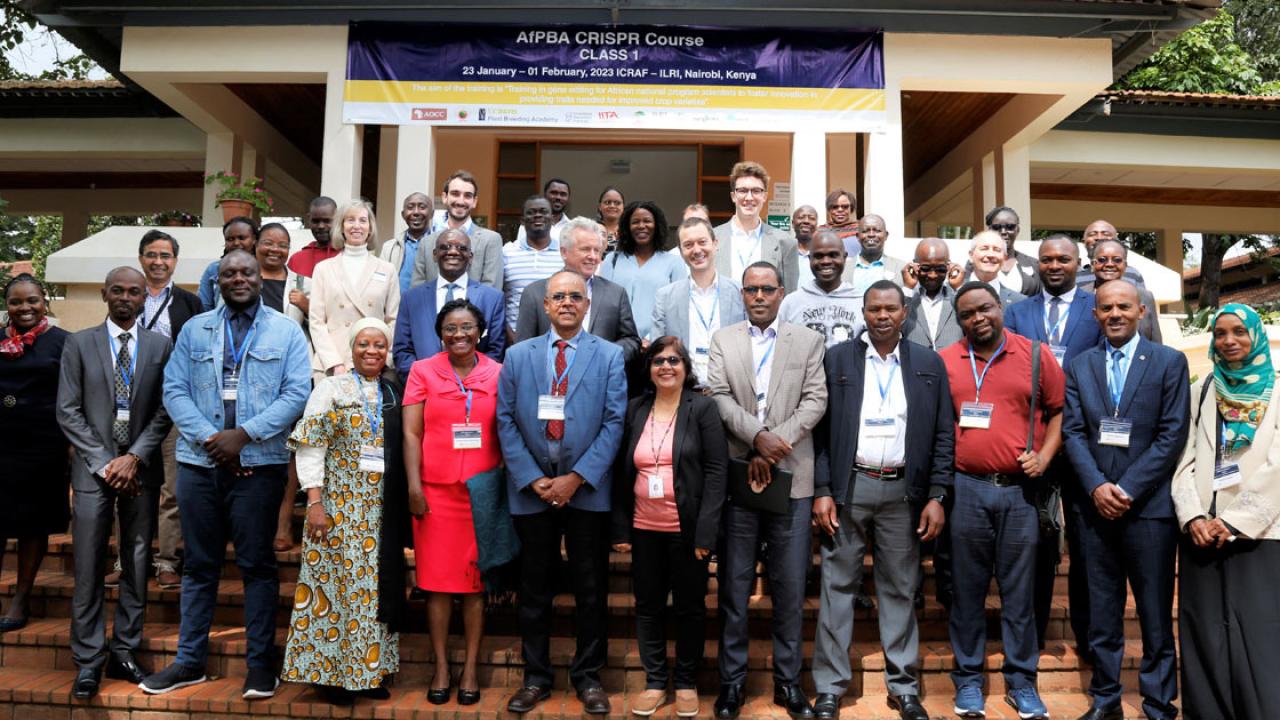
African scientists embark on pioneering CRISPR course
Van Deynze organized program of UC Davis Plant Breeding Academy
Top plant scientists from across Africa have just completed the first phase of a ground-breaking course in gene editing for crops: It aims to harness a cutting-edge breeding tool to adapt African agriculture to growing populations and the threat of climate change.
“The talent’s there. We just need to enable it,” said Allen Van Deynze, of the UC Davis Department of Plant Sciences. “We’re enabling it with training, with tools and with support for their labs. That’s part of our program.”
Van Deynze is an instructor and is organizing this new course of the African Plant Breeding Academy. It’s being offered in Nairobi, Kenya, through the UC Davis Plant Breeding Academy and a network of international partners.
Participating in the course are 11 doctorate-level scientists from seven nations. They’re learning to use CRISPR (Clustered Regularly Interspaced Short Palindromic Repeats), a tool that allows them to make precise and specific changes to DNA sequences in living organisms, including crops.
The technology allows plant breeders to quickly develop crop varieties adapted to a warming climate, and to boost the crops’ nutritional content for important vitamins and minerals including zinc, iron and vitamin A, all of which are critical for human health and development.
The scientists work at institutions that already are researching gene editing in crop plants or have committed to doing so upon their employee’s graduation from the course.
“This training is the first of its kind to impart knowledge, skills and tools to accomplish gene editing in crop plants by national program scientists in Africa,” said Rita Mumm, director of the academy.
“We are honored to be working with the top institutions in the world in this academy, which will enable Africans to drive innovation critical to improving African crops to eliminate stunting due to malnutrition,” Van Deynze added.
Course will contribute to food security on continent
“The gene-editing toolkit training is a momentous occasion that should be celebrated given the scale of the problem that CRISPR is expected to address,” said Dr Howard-Yana Shapiro, founder of the African Orphan Crops Consortium, during the course’s launch. “CRISPR is a key strategy towards improving food nutrition in Africa, and the trainees from this program will be the change agents that will make the impossible happen, especially with the kind of pan-African collaboration we have witnessed today.”
Silas Obukosia, of the African Union Development Agency – New Partnership for African Development, emphasized the organization’s support for gene editing as one of the key innovations that will transform the continent.
“Gene-edited crops and their products that are equivalent to conventionally bred crops should be regulated under the conventional seed laws,” said Obukosia. “Gene editing makes specific, targeted changes to the DNA of an organism and can be programmed to produce products equivalent to those developed through conventional breeding. In contrast, techniques used to develop GMOs often involve introducing genetic material from distantly related organisms to develop traits of economic importance.”
The CRISPR course supports the United Nations’ Sustainable Development Goal 2, which aims to end hunger, achieve food security, improve nutrition and promote sustainable agriculture by 2030.
“It’s a step in the right direction,” said World Agroforestry Interim Director General Ravi Prabhu. “Addressing nutrition by improving local skillsets through such a program is key to improving food security on the continent and an important contribution to a productive and sustainable transformation of African agriculture.”
Network of support to advance African agriculture
The CRISPR course is offered in three sessions of two weeks each over the course of the year. Participants in this first cohort came from a highly competitive applicant pool of 57. Including this class, more than 150 African scientists have gone through programs of the African Plant Breeding Academy. Plans call for offering the CRISPR course in future years
Van Deynze is one of the links in putting the CRISPR course together. It is an initiative of the African Orphan Crops Consortium, of which Van Deynze is the scientific director. (UC Davis is a founding member of the consortium.) It’s offered through the African Plant Breeding Academy, part of the UC Davis Plant Breeding Academy, of which Van Deynze is the co-developer and organizer. The academy is an outgrowth of the UC Davis Seed Biotechnology Center, of which Van Deynze is the director.
Van Deynze and Mumm organized the course in partnership with UC Berkeley’s Innovative Genome Institute and the International Institute for Tropical Agriculture. It is hosted in Nairobi by the Center for International Forestry Research and World Agroforestry (CIFOR-ICRAF) and the International Livestock Research Institute. Additional partners include the African Union, Morrison and Foerster, Bayer, Syngenta, UM6P Ventures and the Foundation for Food and Agricultural Research.
Related links
More about the CRISPR course offered through the African Plant Breeding Academy.
Media Resources
- Susan Onyango, Global Communications Coordinator, Center for International Forestry Research and World Agroforestry (CIFOR-ICRAF), s.onyango@cifor-icraf.org
- Trina Kleist, UC Davis Department of Plant Sciences, tkleist@ucdavis.edu; (530) 754-6148 or (530) 601-6846
